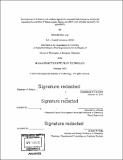Development of N-heterocyclic carbene ligands for nanomaterials in aqueous media and expanding the interface of metal-organic framework (MOF) and polymer chemistry via polyMOFs
Author(s)
MacLeod, Michelle (Michelle Jeanette)
DownloadFull printable version (37.51Mb)
Other Contributors
Massachusetts Institute of Technology. Department of Chemistry.
Advisor
Jeremiah A. Johnson.
Terms of use
Metadata
Show full item recordAbstract
In the field of coordination chemistry, there are many standard organic ligand designs that are optimized for their ease of synthesis as well as established and favorable properties. Nevertheless, there is still room to add new ligand classes to the toolbox for specific applications. This thesis focuses on expansion of the types of ligands available for (1) metallic nanomaterial surface modification and (2) metal-ligand driven supramolecular assembly. (1) Surface ligands are typically used for surface passivation, imparting new properties such as solubility, or introducing a functional handle for further modification. The different demands in many diverse fields such as catalysis, electronics, and biomedicine necessitate that ligands interact strongly with surfaces and are structurally versatile. Herein, we advance N-heterocyclic carbenes (NHCs) as a new class of surface ligands to complement other established classes such as thiols, carboxylic acids, phosphines, ammonium salts, and phosphine oxides. Our studies have focused on ligand design for gold nanoparticles (NPs) and nanorods (NRs) in aqueous media. Using a polyethylene glycol (PEG)-conjugated NHC strategy, we demonstrate the first example of water-soluble NHC-stabilized Au-NPs. We then develop a bidendate NHC-thiol to modify gold NRs for photothermal therapy. (2) We examine the interface between amorphous polymers and crystalline metal organic frameworks (MOFs) in an emerging class of materials called polyMOFs. PolyMOFs use polymer ligands as their building blocks, opening the door to new material properties. In our work, we have developed a strategy for the synthesis of addressable, unimolecular polyMOF-forming oligomers using iterative-exponential growth, which has allowed us to study unique structure-property relationships of polyMOFs. Furthermore, we have developed pre- and post- synthetic modification strategies for polyMOF based materials.
Description
Thesis: Ph. D. in Inorganic Chemistry, Massachusetts Institute of Technology, Department of Chemistry, 2018. Cataloged from PDF version of thesis. Includes bibliographical references.
Date issued
2018Department
Massachusetts Institute of Technology. Department of ChemistryPublisher
Massachusetts Institute of Technology
Keywords
Chemistry.